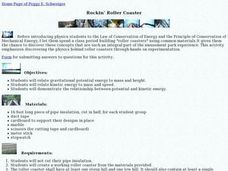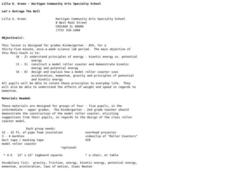Virginia Department of Education
The Rate of a Chemical Reaction
If your pupils think a catalyst is a list of their cats, then this might be the lesson plan for you! Young chemists study the effect of temperature, catalysts, concentration, and particle size on reaction rates during four different...
Rochester Institute of Technology
Skateboard Performance Testing
Perform an activity on performance testing with a lesson focused on the purpose of wheel bearings on skateboards. Learners conduct performance testing on a skateboard to collect and interpret data.
Virginia Department of Education
Heat Transfer and Heat Capacity
It's time to increase the heat! Young chemists demonstrate heat transfer and heat capacity in an activity-packed lab, showing the transitions between solid, liquid, and gaseous phases of materials. Individuals plot data as the changes...
Curated OER
Kinetic and Potential Energy
Students calculate kinetic and potential energy in the lab. In this physics lesson, students demonstrate how energy can be transformed from one form to another. They collect data from the experiment and write a detailed lab report.
Curated OER
Falling Water
Students drop water from different heights to demonstrate the conversion of water's potential energy to kinetic energy. They see how varying the height from which water is dropped affects the splash size. In seeing how falling water can...
Curated OER
Building a Roller Coaster
High schoolers describe the law of conservation of energy. They identify the conversion between potential and kinetic energy. They investigate and describe the application of Newton's Laws of Motion.
Curated OER
Acceleration, Drag, Gravity, Motion, Forces, and Friction
Eighth graders build and run mousetrap cars in order to measure distance, time, and mass for their cars. They use these measurements to calculate average speed and kinetic energy, then create a slide show to visually explain how the car...
Curated OER
Introduction to Materials Science - Part B
Students are able to give specific examples of what to do and what not to do during given safety situations, and classify materials as metals, polymers, ceramics/glass, or composites. They are able to distinguish between chemical and...
Curated OER
Rockin Roller Coaster
Students discuss gravitational potential energy, kinetic energy, and the relationship between potential and kinetic energy. They create a working roller coaster from provided materials and criteria then evaluate each roller coaster. They...
Curated OER
Perpetual Motion
Students are introduced to the concept of Energy Conservation with the example of: Tony Hawk seems to defy the conservation of energy as he keeps reaching new heights on each pass on the halk-pipe. Actually, Tony is supplying the extra...
Curated OER
A River Ran Through It
Students research how water is used to generate electricity. They investigate water's potential-to-kinetic energy transfer in hands-on activities about falling water and waterwheels. They take measurements, calculate averages and graph...
Science 4 Inquiry
Investigating How Heat Flows
It is impossible to cool down a glass of water by adding ice. Young scientists explore heat transfer through videos, experiments, and interactive games. They quickly catch on that the water melts the ice and things aren't always as they...
Curated OER
Alternative Energy
Students identify the five major alternative energy sources. In this physical science lesson, students assess the advantages and disadvantages for each type of energy. They complete a concept map using information they researched.
Curated OER
Energy Sources - Water Wheel Investigation
Students create their own water wheel to show the conversion of potential energy to kinetic energy. They discover the production of electricity through hydropower and apply it to different situations. They share any data collected with...
Curated OER
Breaking Energy
Students experiment with the amount of work required to break a piece of wood by hanging masses from a string attached to a thin dowel of wood. At the completion of activity, students calculate if a fast moving hand could break the dowel.
Curated OER
Mechanical Energy
Young scholars discover the difference between kinetic and potential energy in an experiment using toy cars and tracks. In small groups, they set up the experiment to determine the distance milk cartons will travel when hit by toy car....
Curated OER
Let's Outrage the Bull
Students study kinetic and potential energy. In this energy activity, students in grades K-2 understand the differences between kinetic and potential energy. Students in grades 3-5 demonstrate that kinetic and potential energy. Students...
Curated OER
Wind Power! 2
Fourth graders explore how engineers transform wind energy into electrical energy by building their own miniature wind turbines and measuring the electrical current it produces. They see how design and position affect the electrical...
Curated OER
Design Your Own Rube Goldberg Machine
Young scholars participate in a culminating activity for a unit on Energy and Simple Machines. They are challenged to incorporate simple machines in to a complex mechanical system. While designing and testing their machine they will...
Curated OER
A Hilly Ride
Fifth graders investigate situations that show how kinetic and potential energy are exchanged. They determine how friction is a source of energy transfer from kinetic to thermal energy by experimenting with a car and track. They answer...
Curated OER
Potential Energy Diagrams
In this reactions worksheet, students use graphs showing reaction progress to determine if the reaction is exothermic or endothermic, the activation energy, and the enthalpy of change. This worksheet has 1 graph, 7 short answer, and 16...
Curated OER
Work and Energy
Students show that energy is conserved in the laboratory. They calculate the work done by a force on an object as the product of the force and a displacement of the object from a reference point.
Virginia Department of Education
Molar Heat of Fusion for Water
How can you describe heat of fusion in a way the class understands and relates the importance of this concept to present day issues? In this third lesson of the series, learners conduct an experiment, demonstrating the flow of heat...
Virginia Department of Education
Soap, Slime, and Creative Chromatography
Do you think chromatography paper suffers from separation anxiety? Young chemists make soap, slime, silly putty, and experiment with chromatography in this lesson. The material includes clear instructions for each experiment along with...

























